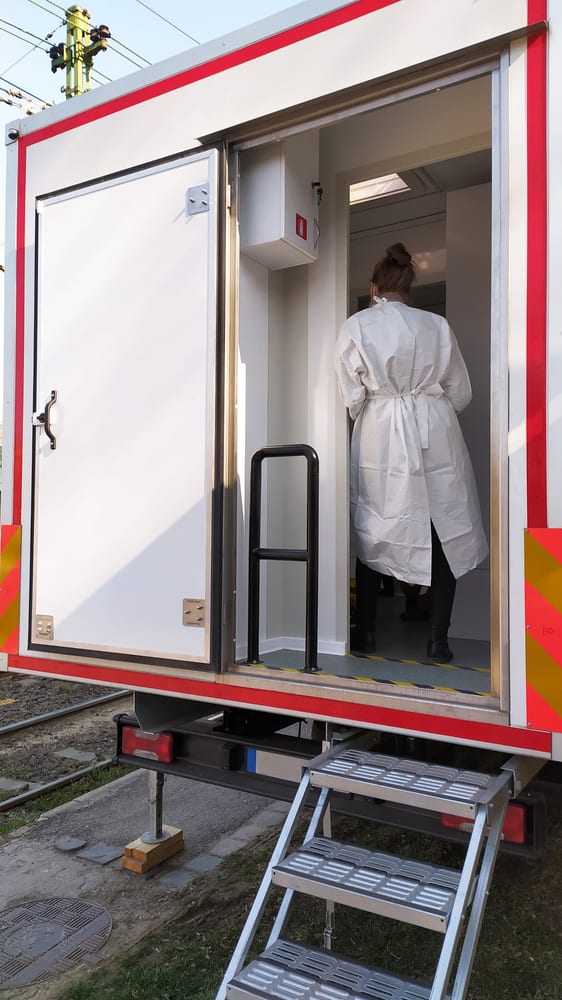Teaming up with the National Institute of Allergy and Infectious Diseases (NIAID), American pharmaceutical company Eli Lilly recently announced an innovative trial that aims to provide temporary COVID-19 immunity to one of the most high-risk populations: elderly patients in nursing homes and assisted living facilities. The 2,400-person trial will test Lilly’s experimental, lab-grown COVID-19 neutralizing antibodies. Ideally, once given to patients by doctors, the antibodies will either attack a new SARS-CoV-2 infection or remain in the blood for several weeks, preventing infection during that timeframe. To conduct this phase III trial, Eli Lilly is utilizing an unexpected resource: retro-fitted recreational vehicles, more commonly known as RVs, which they have transformed into mobile medical units.
On-the-Go Clinical Research and Healthcare
Eli Lilly’s “customized mobile research units” were devised so that researchers could include the elderly population in clinical studies. Traditionally clinical trials are conducted in hospitals, clinics, doctors’ offices, universities, and other similar locations, but due to the lockdowns currently impacting most senior living communities, many elderly people are unable to visit clinical trial sites. By converting RVs into mobile research units, Eli Lilly is bringing clinical trials to patients instead of the other way around.
After stripping each RV of its typical interior components (a dining table, a bed, storage, cabinets), the team added items necessary for clinical research: climate-controlled storage, material preparation space, laboratory equipment, and more. A customized trailer follows behind each RV, transporting all of the supplies researchers require for on-site clinical trials. With this versatile fleet of mobile medical units, Eli Lilly can travel to long-term care facilities across the United States and enroll residents and staff members at facilities with COVID-19 outbreaks.
Eli Lilly is not the first company to utilize mobile vehicles for healthcare purposes – and it certainly won’t be the last.
In a variety of forms, including the familiar bloodmobile, mobile medical units have been serving communities for over 50 years. Popular applications for these convenient vehicles include general physician appointments, dental appointments, mobile imaging, opioid treatments, and more. These versatile vehicles help medical facilities and organizations extend their reach and provide alternative healthcare options, especially in underserved communities where patients are unable to travel to brick-and-mortar locations. By bringing high-quality resources and personnel directly into communities that need them, mobile medical units can help alleviate health disparities in vulnerable populations.
For example, Family Health Centers of San Diego has three mobile medical units that it uses to provide health care services, including primary care, pediatric services, reproductive health services, and STD screenings and treatments. Ryan Health converted a 33-foot-long Winnebago into a mobile medical unit to bring quality health care to underserved communities in New York City, equipping the vehicle with two full exam rooms (including one designed for handicapped patients). And in Staten Island, HHC Health Connections uses mobile medical units to deliver primary health services to uninsured and low-income populations.
Across the United States, mobile medical vehicles are currently being used to combat the novel coronavirus, from medical organizations using vehicles to support COVID-19 drive-thru testing to a Facebook group that matches front-line healthcare workers with donated RVs so that they can self-isolate away from their families. Mobile medical units are being used in a variety of applications, including triage units, command centers for essential workers, quarantine facilities, community outreach vehicles, and patient treatment rooms.
Some experts believe that mobile medical units represent “an untapped resource for our healthcare system,” especially during health crises like the COVID-19 pandemic. Now more than ever, innovative and creative healthcare solutions are needed to reach underserved populations, offer versatility in the event of damaged infrastructure, and accelerate the response to the pandemic.
Are you looking for a CRO to assist with your preclinical or clinical drug development related to the novel coronavirus or COVID-19? QPS has CLIA-certified and GLP-compliant laboratories ready to fast-track your novel coronavirus and COVID-19 RT-qPCR/QPCR and Serological Assays and vaccine development programs. Since 1995, QPS has provided discovery, preclinical, and clinical drug development services. An award-winning leader focused on bioanalytics and clinical trials, QPS is known for proven quality standards, technical expertise, a flexible approach to research, client satisfaction, and turnkey laboratories and facilities. For more information, visit www.qps.com/coronavirus or email covid19study@www.qps.com.








